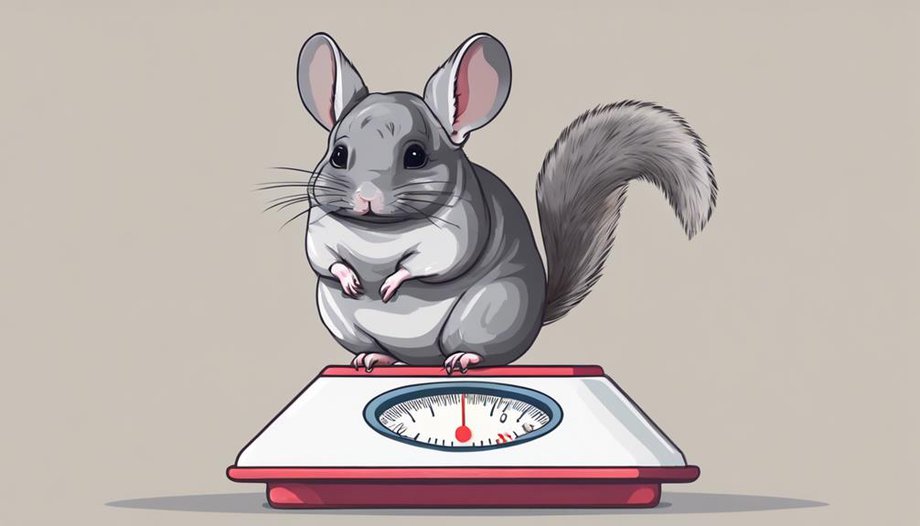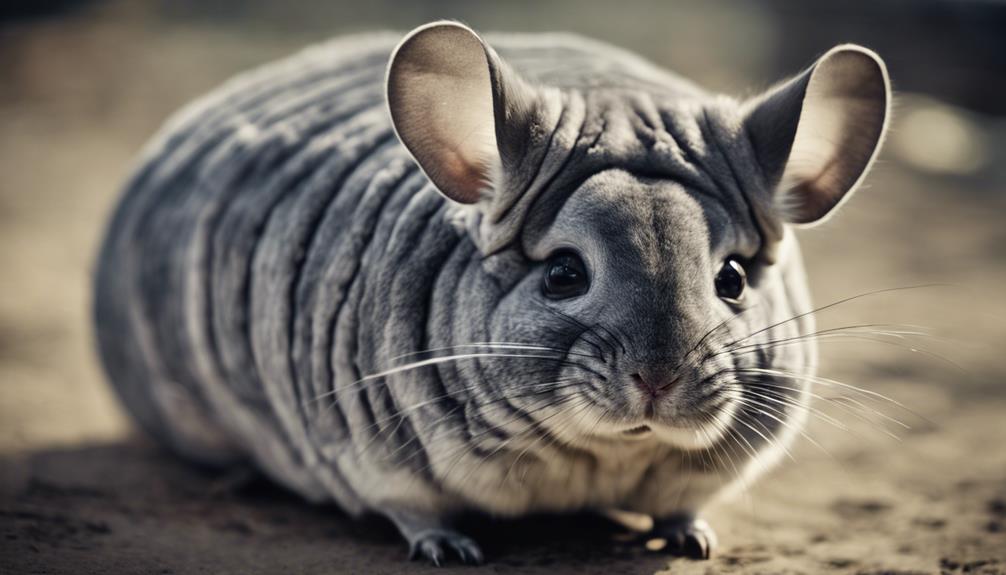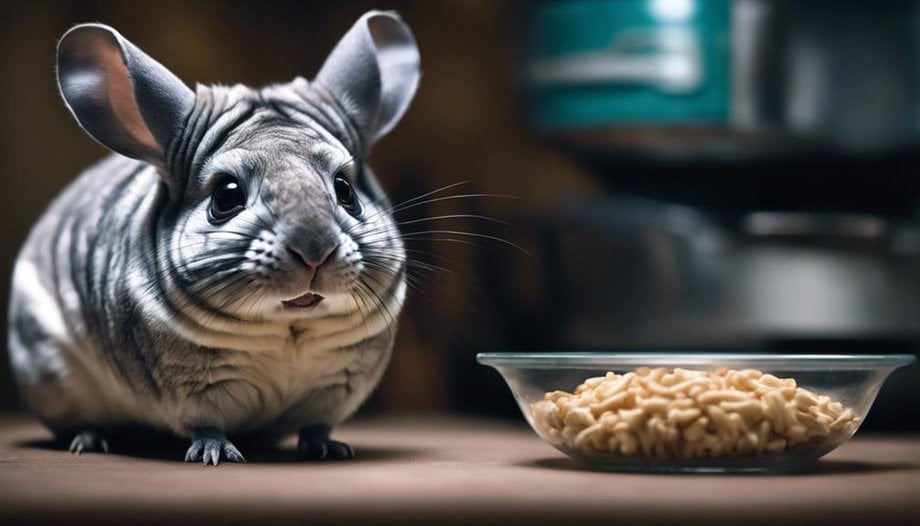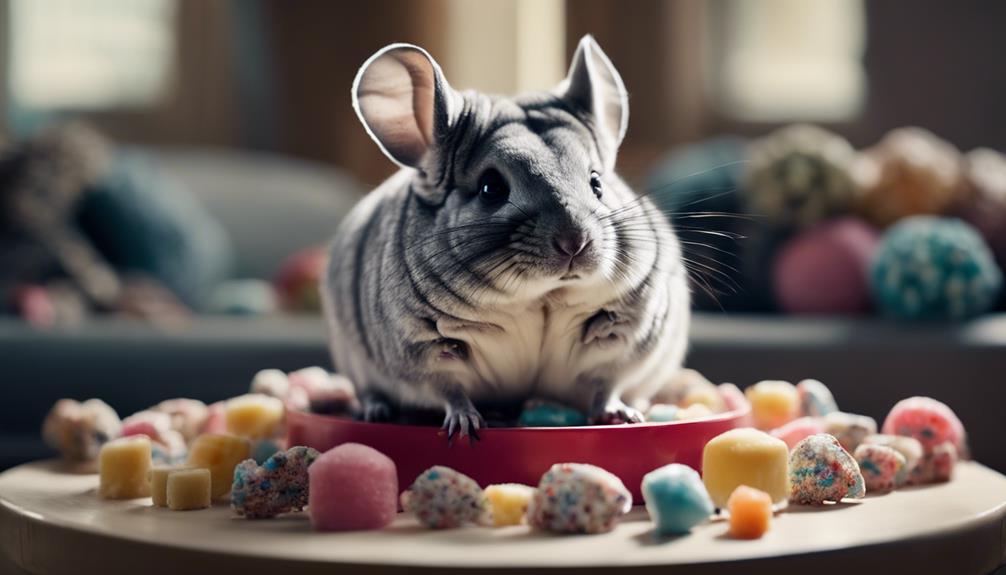When to Worry About Your Chinchilla's Weight Loss or Gain

Chinchillas are small, adorable rodents that make great pets. They require a diet high in fiber and low in fat to maintain a healthy weight. It's essential for chinchilla owners to monitor their pet's weight regularly to ensure they are not gaining or losing weight too quickly. Sudden weight changes in chinchillas can be a sign of an underlying health issue, so it's important to consult a veterinarian if you notice any unusual fluctuations in your chinchilla's weight. Regular exercise and a balanced diet are key to keeping your chinchilla at a healthy weight. Remember, prevention is always better than cure when it comes to your pet's health.
Understanding the dietary needs of chinchillas is crucial for maintaining their overall health and well-being. Chinchillas have sensitive digestive systems and should be fed a diet that is high in fiber and low in fat. A diet that is too high in fat can lead to obesity, which can have serious health consequences for chinchillas. It's important to provide your chinchilla with a balanced diet that includes hay, pellets, and fresh vegetables. Additionally, chinchillas should have access to clean water at all times. Monitoring your chinchilla's weight and providing them with a healthy diet and regular exercise are key to keeping them happy and healthy.
Normal Weight Range for Chinchillas
Chinchillas typically weigh between 500 to 800 grams, with variations depending on age, genetics, and diet. Proper weight management is essential for chinchilla health. To assess if a chinchilla is within the ideal body weight range, owners can use condition scoring. This involves gently feeling along the chinchilla's spine and ribs. An ideal weight chinchilla should have some fat cover over the ribs but still feel firm to the touch.
Maintaining a healthy weight is crucial for chinchillas as obesity can lead to various health issues. Providing a balanced diet rich in high-quality hay, pellets, and limited treats can help in weight management. Regular exercise and a spacious environment for the chinchilla to move around also play a vital role in keeping their weight in check.
Signs of Weight Loss in Chinchillas

Detecting weight loss in chinchillas can be challenging, but observing subtle changes in their behavior and appearance is crucial for early intervention. One of the first signs to look out for is a decrease in appetite. If your chinchilla is eating noticeably less than usual, it could be an indication of weight loss. Additionally, a decrease in activity level or energy may suggest that your chinchilla is not feeling well or is experiencing weight loss. Changes in fur quality, such as a lackluster coat or bald patches, can also be signs of underlying health issues leading to weight loss. It's essential to monitor your chinchilla's weight regularly and keep track of any fluctuations. Below is a table summarizing key signs of weight loss in chinchillas:
| Signs of Weight Loss |
|---|
| Decreased appetite |
| Low energy levels |
| Poor fur condition |
| Weight tracking |
| Behavioral changes |
Causes of Sudden Weight Loss

Sudden weight loss in chinchillas can be caused by various factors. Changes in their diet, such as a sudden decrease in food intake or a switch to a lower quality food, can lead to weight loss.
Additionally, underlying illnesses or stress can also contribute to a chinchilla rapidly losing weight.
Dietary Changes Impact Weight
After introducing dietary changes, chinchilla weight can be significantly impacted, potentially leading to sudden weight loss. It's crucial to monitor any alterations in their food intake carefully. Changes in their diet, such as reducing the amount of hay, pellets, or fresh vegetables, can result in weight loss.
Additionally, introducing new foods too quickly can upset their digestive system, causing a decrease in appetite and subsequent weight loss. If exercise routines are modified or if nutritional supplements are added or removed from their diet, these changes can also impact their weight. To prevent sudden weight loss due to dietary adjustments, it's essential to make gradual transitions, ensuring that the chinchilla maintains a balanced and nutritious diet.
Illness Causes Weight Loss
When chinchillas experience sudden weight loss, it can often be attributed to underlying illnesses affecting their health and well-being.
- Disease Prevention: Regular veterinary check-ups are crucial to catch any potential illnesses early.
- Weight Management: Monitoring your chinchilla's weight regularly can help in spotting any sudden changes.
- Nutritional Requirements: Ensuring your chinchilla's diet meets all their nutritional needs is essential for their overall health.
- Weight Fluctuations: Sudden weight loss could indicate an underlying issue, while sudden weight gain may also be a cause for concern.
- Veterinary Care: Seeking prompt veterinary care if you notice any unusual weight changes is vital for your chinchilla's well-being.
Stress Affects Weight
Stress can significantly impact a chinchilla's weight, leading to sudden weight loss and potential health concerns. Chinchillas, like humans, can experience stress from various factors such as changes in their environment, loud noises, or even loneliness. When stressed, chinchillas may exhibit changes in their eating habits, either consuming significantly less food or engaging in emotional eating, which can result in weight fluctuations.
To help manage stress in chinchillas, creating a calm and stable environment is crucial. Providing enriching activities, social interaction, and a balanced diet can aid in stress management. Monitoring your chinchilla's behavior and weight regularly is essential to catch any sudden changes that could indicate stress-related weight loss and address them promptly.
Monitoring Weight Gain in Chinchillas
Chinchilla owners should closely monitor their pets' weight by ensuring they provide a proper diet rich in hay, pellets, and fresh vegetables.
Engaging chinchillas in regular exercise and providing opportunities for activity is crucial to maintaining a healthy weight.
Regular veterinary check-ups are essential to address any weight gain concerns early on and prevent potential health issues.
Proper Diet for Chinchillas
Maintaining a balanced diet is crucial for ensuring the optimal health and weight of chinchillas. When it comes to their nutritional requirements, chinchillas thrive on a diet rich in high-quality hay, specifically timothy hay. Additionally, they should have access to chinchilla pellets that are specially formulated to meet their dietary needs.
Fresh water should always be available to keep them hydrated. When considering healthy treats, chinchillas enjoy occasional nibbles on dried fruits like raisins or a small piece of a dried apple slice. However, treats should be given sparingly to prevent weight gain.
Ensuring a well-rounded diet for these adorable creatures is a cornerstone of their care and well-being.
Exercise and Activity Levels
To ensure the optimal health and weight of chinchillas, it's essential to monitor their exercise and activity levels regularly.
Playtime routines and enrichment activities are crucial for chinchillas to maintain a healthy weight and overall well-being. Engaging in regular exercise not only provides mental stimulation but also physical health benefits for these small pets.
Chinchillas are naturally active animals, and providing them with opportunities to play and explore can help prevent obesity risks and ensure they stay fit. Encouraging movement through toys, tunnels, and supervised play sessions can contribute to their exercise regime.
Monitoring their activity levels and adjusting playtime routines accordingly can help chinchilla owners promote a healthy lifestyle for their furry companions.
Regular Veterinary Check-Ups
Regular veterinary check-ups play a vital role in monitoring weight gain in chinchillas to ensure their overall health and well-being. These check-ups involve thorough examinations and discussions with the vet to address any concerns regarding weight management. Here are some key points to consider:
- Regular health checkups can help detect any underlying health issues affecting weight.
- Monitoring weight trends over time aids in identifying any sudden weight changes.
- Vets can provide tailored advice on diet and exercise to maintain a healthy weight.
- Early intervention for weight-related issues can prevent more serious health problems.
- Building a trusting relationship with the vet can lead to better overall care for the chinchilla.
Reasons for Weight Gain in Chinchillas

Weight gain in chinchillas can be attributed to various factors related to their diet and lifestyle. Ensuring a balanced diet and a suitable living environment is crucial in maintaining a healthy weight for these small pets. Here are some reasons for weight gain in chinchillas:
| Factors | Description |
|---|---|
| High-calorie diet | Chinchillas may gain weight if they are fed too many treats or a diet high in fat and sugar. |
| Lack of exercise | Limited playtime or small cages can lead to a sedentary lifestyle, causing weight gain in chinchillas. |
| Overfeeding | Owners sometimes unintentionally overfeed their chinchillas, leading to excess weight. |
| Stress or boredom | Chinchillas may overeat when stressed or bored, resulting in weight gain. |
| Medical conditions | Certain medical issues like hormonal imbalances or metabolic disorders can also contribute to weight gain in chinchillas. |
When to Seek Veterinary Help

If your chinchilla shows persistent signs of weight gain despite adjustments to their diet and lifestyle, consulting a veterinarian is advisable to address any underlying health concerns. While weight changes can sometimes be managed at home, certain situations require professional intervention.
Here are some key reasons to seek veterinary help:
- Behavior Changes: Sudden shifts in behavior could indicate an underlying health issue affecting your chinchilla's weight.
- Stress Levels: High levels of stress can lead to changes in eating habits and weight, necessitating veterinary guidance.
- Age Differences: Older chinchillas may face unique health challenges that contribute to weight fluctuations requiring expert assessment.
- Breed Variances: Different chinchilla breeds may have specific predispositions to weight-related issues, making veterinary advice essential.
- Inexplicable Weight Changes: If your chinchilla's weight changes remain unexplained despite your efforts, professional help is crucial to uncover potential hidden health concerns.
Tips for Maintaining Ideal Weight

To help your chinchilla maintain its ideal weight, focus on providing a balanced diet and regular exercise. When it comes to diet, ensure your chinchilla has a high-quality hay available at all times, as it's crucial for their digestive health and weight management. Additionally, provide a limited amount of specially formulated chinchilla pellets to meet their nutritional needs without causing weight gain. Fresh vegetables can be given as treats but shouldn't exceed 10% of their overall diet to prevent excessive calorie intake.
Regular exercise is vital for chinchillas to stay healthy and maintain their weight. Create an engaging environment with exercise-friendly toys and structures in their habitat. Encourage playtime outside the cage in a safe and secure area. Exercise wheels can also be a great addition to their routine to keep them active.
In some cases, nutritional supplements may be necessary to support your chinchilla's overall health. Consult with a veterinarian before adding any supplements to their diet to ensure they're safe and appropriate for your pet. By focusing on a balanced diet, regular exercise routines, and careful consideration of nutritional supplements, you can help your chinchilla maintain its ideal weight and overall well-being.
Frequently Asked Questions
Can Chinchillas Experience Weight Fluctuations Due to Seasonal Changes in Temperature or Daylight Hours?
Do seasonal changes affect chinchillas' weight? Seasonal shifts in temperature and daylight hours can impact their activity levels and metabolism, leading to weight fluctuations. It's essential to monitor their weight for any concerning changes.
Are There Specific Dietary Supplements or Vitamins That Can Help With Weight Management in Chinchillas?
Chinchillas require a balanced diet plan to manage weight effectively. Including essential supplements can aid in nutritional balance, supporting overall health. Careful consideration of their diet and specific needs can help maintain optimal weight and well-being.
Can Stress or Changes in Environment Contribute to Weight Loss or Gain in Chinchillas?
Stress management and environmental factors can indeed impact a chinchilla's weight. Changes in routine or surroundings may lead to weight loss or gain. Providing a stable and comfortable environment, along with proper diet, can help maintain their health.
How Often Should Chinchillas Be Weighed to Monitor Their Weight Changes?
Chinchillas should be weighed regularly to monitor weight changes effectively. Adjusting their diet based on these weigh-ins can help maintain their health. It's recommended to weigh them every 1-2 weeks for accurate tracking.
Are There Any Specific Exercises or Activities That Can Help Chinchillas Maintain a Healthy Weight?
Chinchillas can maintain a healthy weight through enrichment activities and diet modifications. Playtime and socialization opportunities encourage exercise. These activities not only support physical health but also enhance their mental well-being, promoting a balanced lifestyle.











